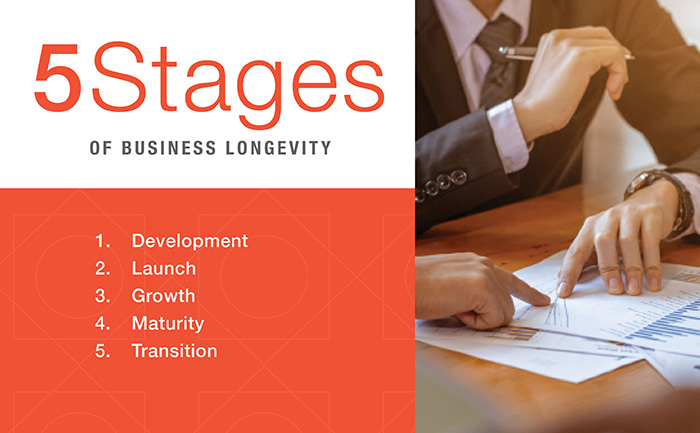5 Stages of Business Longevity: Exit strategies
In our Business Longevity series, we’ve examined strategies you can use to make sound business and financial decisions. Today we look at the final stage of business longevity: having an exit strategy that fulfills your operational and financial needs.
Your business has been a priority – and a passion – for you throughout your entrepreneurial journey. Now it’s time to consider its future, and your own.
How to know when you are ready to exit
How can you be sure that the time is now? There are a few key factors that might help you make your decision.

Retirement
You’ve met your goals for retirement: Having thought about retirement and set a plan with your advisor, you know what kind of capital you need to be able to enjoy the well-earned free time in the way you would like to. If you’ve achieved that savings goal (factoring in any outstanding debt), then it might be a good time to consider if business ownership and the work associated with it is still how you would like to spend your time.
The next entrepreneurial journey
You’ve identified new opportunities for yourself: Like any effort we choose to undertake in life, sometimes things come to a natural conclusion. Perhaps you have developed a new product or business to invest your time and money into. With this new business concept and strategy, you are ready to start the next entrepreneurial journey.
The next generation of leadership
You’ve identified potential successors to maintain your vision: For many business owners, their legacy is defined by the successful transition of their organization, ensuring it endures for years to come. Finding the next generation of leadership for your business can be one of the most rewarding experiences.
How can ownership be transferred?
Ownership of your business can be transferred to an individual(s) from within your company, or an organization/individual(s) from outside your business. Upholding the vision you created, your successor could be anyone from family members or employees to a strategic or financial buyer.
Transferring ownership to individuals or organizations outside your business can be accomplished through:
- Private Equity, which transfers ownership to a group of investors, creating a liquidity event for the current owner(s) while simultaneously providing expertise for the future of the business
- Initial Public Offering (IPO) by offering shares of your business to the general public in a new stock issuance
- Or, a strategic buyer, which transfers complete ownership to an individual outside of your business, a competitor, an organization within the same supply chain, etc., opening new opportunities to create a more powerful entity
Transferring ownership to individuals within your business can be accomplished through:
- A management buy-out, which allows your business’ management team to purchase the business they manage and are deeply familiar with
- A complete ownership transfer by the gifting of shares or sale of your business to a family member or business partner
- An Employee Stock Ownership Plan (ESOP) gives stock ownership to employees through the establishment of a trust. This ownership structure connects your company's employees to the long-term success of the agency and allows for the possibility of the transitioning owner to remain involved in a leadership role.
Be prepared for the journey ahead.
As market conditions change and developments to your business are made, it’s important to revisit and reevaluate your exit strategy or succession plan. Updating and making timely adjustments or alterations to your exit strategy or succession plan can help ensure terms that are most favorable for all parties.
Whether you decide to transfer ownership within your company or outside, planning for the future of your business after your exit can prepare your organization for the road ahead. Setting up long-term company success through succession planning and exit strategies will help your business achieve critical outcomes well beyond your tenure.
As you plan for the future, our business banking team at Westfield Bank is here to provide you with the guidance, insights, and financing options to meet your goals.



